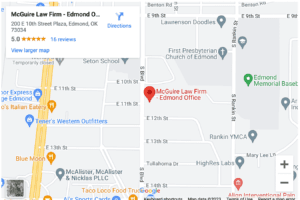Crushing Injury Attorney in Oklahoma City

A crushing injury can have devastating effects, including death, amputation, and kidney failure.
Almost any type of accident can cause a crushing injury. Your leg could get crushed in a pedestrian accident. A machine could crush your hand in a workplace accident. A dog could even crush your arm in a dog bite attack.
Want to learn more about crushing injuries and the compensation you can get for them? Read our guide below.
How Do Crushing Injuries Happen?
A crush injury occurs when your body or a part of your body gets compressed. The compression force can come from the weight of an object. You could receive a crushing injury when a car runs over your arm, for example.
A compression force can also come from a powered machine. For example, a hydraulic press could capture your hand and crush it.
A further danger of crushing injuries comes from the rescue process. Freeing you from the object that’s crushing you might require rescuers to amputate the trapped body part.
What Are the Short-Term Effects of a Crushing Injury?
Crushing injuries often cause immediate damage. Compression on your chest can stop your lungs from expanding. Without quick action, you could suffocate.
The compression force can also break blood vessels under the skin. A mild crushing injury, like a finger crushed in a door, could cause nothing more than pain and bruises.
But more powerful forces can cause extensive damage. A compression force can tear the skin. You could even experience heavy bleeding.
Contradictorily, the compression force can prevent bleeding as long as your body part remains trapped. But you could bleed severely after rescuers free you from the compressive force.
Crushing injuries can also damage soft tissue. Muscles, ligaments, and tendons can get stretched or torn. Nerves can get compressed or severed, disrupting their ability to carry nerve signals.
As a result, you might experience:
- Pain
- Swelling
- Muscle weakness
- A reduced range of motion
In most cases, doctors allow soft tissue to heal without surgery. In some extreme cases, however, doctors may operate to reattach muscles, tendons, or ligaments.
One of the most common crushing injuries includes fractured bones. Crushing forces often shatter bones into several pieces. Doctors reconstruct the bone from these pieces so it can heal properly. This often requires surgery to implant plates and screws in the bones.
Occasionally, the surgeon will use bone grafts to replace any missing pieces of bone. If the force crushes the bone beyond repair, doctors may need to amputate it.
The bone fragments can cause additional damage as they grind into the soft tissue. Bone fragments can sever or compress nerves and tear blood vessels. These fragments can cause pain, inflammation, and bleeding.
What Are the Long-Term Complications of a Crushing Injury?
The effects of crushing injuries can go beyond the initial trauma. Some long-term effects of a crushing injury may include:
Amputation
If the tissue sustains severe damage, doctors may need to amputate the crushed body part. Although surgeons can repair nerves and blood vessels, they might not have enough tissue to work with after a large crushing injury or a crushing injury that mangles the soft tissue.
Infection
Infection often occurs from bacteria and other microbes that enter a wound. A crushing injury can quickly get infected, particularly if debris gets into the wound.
For example, crushing injuries sometimes happen in motorcycle accidents when a car hits a rider, and they get pinned under their motorcycle. Engine fluids, broken glass, and road gravel could get into the wound. This debris can increase the risk of infection.
Compartment Syndrome
The healing process naturally causes inflammation. In turn, inflammation can cause pain and swelling.
The tissue around crushing injuries can begin to swell. Compartment syndrome happens when swelling cuts off the blood supply to nearby healthy tissue. This starves the healthy tissue of nutrients and oxygen, causing tissue death.
Compartment syndrome can damage or kill tissue that was otherwise unharmed from the crushing injury. A crushed arm could swell. The swollen tissue could cut off circulation to the hand. The patient could lose their hand, even though it was not crushed.
Crush Syndrome
After a crushing injury, you could experience substantial tissue death. When cells die, they release toxins. The dead cells and the toxins that are released can enter the bloodstream.
The kidneys work to clean the blood in the body. Crush syndrome happens when the kidneys become overwhelmed by the dead cells and toxins from your crush injury. Crush syndrome can cause your kidneys to shut down.
What Are the Risk Factors for a Crushing Injury?
Some types of accidents with an increased risk of crush injuries include:
Car Accidents
Front-end collisions can cause the firewall to collapse and crush your legs. A side collision could trap your body between the seat, door, and steering wheel. The roof can collapse in a rollover car accident. You could get crushed between your vehicle and the road.
Pedestrian and Bicycle Accidents
Getting hit by a car in a pedestrian or bicycle accident can expose you to a crushing injury. After being hit, you could fall into the roadway. The car that hit you or another passing car could run over you, causing a crushing injury.
Motorcycle Accidents
Crushing injuries can happen in a few ways during a motorcycle accident. You could get trapped between an object and the vehicle that hit you. You could get run over after falling into the road. You could get trapped underneath your motorcycle.
Workplace Accidents
Crush injuries can happen in many ways in the workplace. You could drop an object onto your foot. An object could fall onto you. You could get crushed by a vehicle or trapped in a machine.
What Compensation Can I Recover for Crushing Injuries?
Injury compensation after a crushing injury should include your medical expenses. These expenses could be substantial because of the treatment and therapy you could require after being crushed.
You can also seek compensation for the income you lost during your recovery. A prolonged period of recovery could keep you from working for weeks or months at a time.
In many cases, you can also claim compensation for your pain and suffering. With a crushing injury, you might suffer physical pain, mental anguish, PTSD, and other types of physical and mental trauma that diminish your quality of life. Pain and suffering damages are designed to compensate you for this loss.
Contact an Oklahoma City Personal Injury Lawyer for Help
To discuss the compensation you might receive for your crushing injury, contact McGuire Law Firm for a free consultation. We’ll listen to the facts of your case and help you to develop an effective strategy to move forward.

